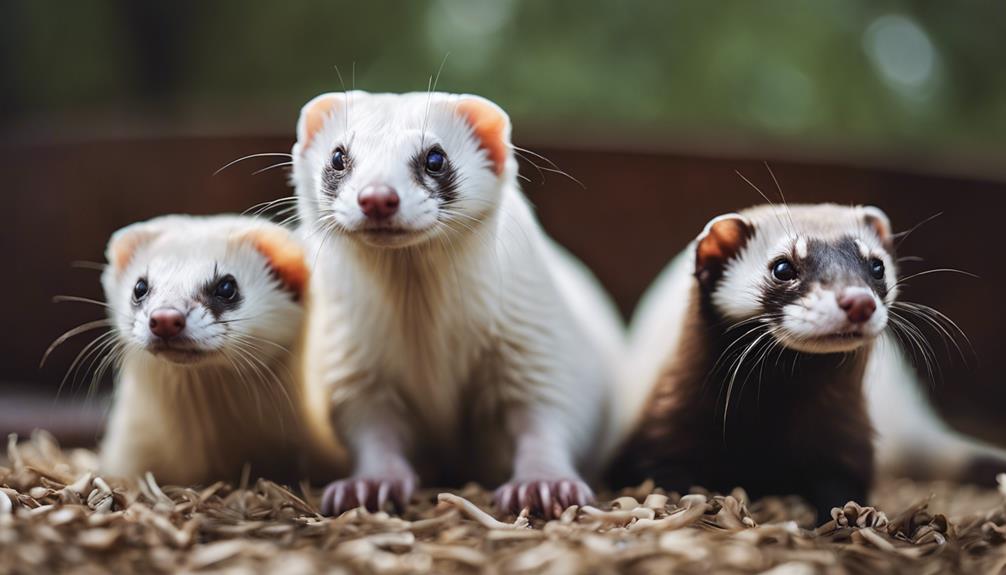Do Different Ferret Types Have Different Care Needs?

Ferrets are playful and social animals that come in various types and colors. It is essential to understand the specific care needs of each type to ensure their well-being. From albino to sable, each ferret type may have different dietary requirements, exercise needs, and grooming routines. Providing proper care for your ferret type is crucial for their health and happiness.
Understanding the differences between ferret types can help you create a suitable environment for your pet. Make sure to research and educate yourself on the specific care needs of your ferret type to provide the best possible care. Regular veterinary check-ups and a balanced diet are also essential for keeping your ferret healthy and happy. By being knowledgeable about your ferret type's requirements, you can ensure a fulfilling and enriching life for your furry friend.
Albino Ferrets Care Considerations
Caring for Albino Ferrets: What You Need to Know!
Hey there, ferret friends! Ever wondered how to best care for those adorable albino ferrets? Let's dive into some essential tips to keep these special furballs happy and healthy!
� Sun Protection: Did you know albino ferrets have sensitive skin that can easily sunburn? It's super important to keep them out of direct sunlight to prevent skin damage and potential skin cancer. Make sure they've shady spots or keep them indoors when it's sunny outside.
�⚕️ Medical Needs: Albino ferrets have unique genetic traits that make them more susceptible to certain health issues. Regular visits to a vet who knows about ferret care can help catch any problems early on. Taking care of their health is key to keeping them in tip-top shape.
� Environment Matters: Creating a safe and clean living space for albino ferrets is crucial. Ensure good ventilation, the right temperature, and comfy bedding to make sure they feel right at home. A happy environment means happy ferrets!
Sable Ferrets Care Specifics

Do you know how to take care of your sable ferret? Let's dive into some key points to ensure your furry friend stays happy and healthy!
Coat Coloration:
- Sable ferrets have a stunning coat color of rich, dark brown with a lighter undercoat.
- Regular grooming is essential to prevent matting and keep their coat sleek.
Behavior:
- Sable ferrets are playful and curious by nature, so they need lots of mental and physical stimulation to stay content.
Health Risks:
- These cute critters are prone to adrenal gland disease, so regular vet check-ups are a must to catch any issues early on.
Dietary Needs:
- To support their energetic lifestyle, sable ferrets require a high-quality diet rich in protein.
Taking care of a sable ferret involves a bit of grooming, playtime, and good nutrition. By understanding these care specifics, you can ensure your sable companion leads a happy and healthy life!
Angora Ferrets Care Requirements

Angora ferrets have distinctive care needs that require special attention. Their long, luxurious fur demands regular grooming to prevent matting and tangling.
Additionally, a balanced diet tailored to their specific dietary requirements is crucial for their overall health.
Regular monitoring for potential health concerns is essential to keep Angora ferrets happy and thriving.
Grooming Needs for Angora Ferrets
Taking Care of Your Fluffy Angora Ferret
Do you want to keep your Angora ferret looking fabulous and feeling great? Here's how you can take care of their beautiful coat like a pro:
- Brush, Brush, Brush: Angora ferrets have long, silky fur that needs regular brushing to stay smooth and tangle-free. Grab a gentle brush or comb made for long-haired pets and give them a nice grooming session to keep shedding under control.
- Soapy Spa Time: Your Angora buddy will appreciate a bath every now and then to stay clean and happy. Use a shampoo made for ferrets and lukewarm water to give them a refreshing wash. Make sure to rinse thoroughly to avoid any skin issues.
- Trimming Troubles: Keep an eye on the fur around their face, ears, and bottom to prevent mats and keep things tidy. Use small scissors to carefully trim any unruly fur to keep your Angora ferret looking sharp.
Dietary Requirements Specific to Angoras
Are you taking care of an Angora ferret? These fluffy creatures have special dietary needs to keep them healthy and happy. Let's dive into some easy tips to make sure your Angora ferret stays in top shape!
�️ Nutritional Balance:
- Feed your Angora ferret high-quality protein to help them stay strong and healthy.
- Limit carbohydrates in their diet to keep their energy levels balanced.
- Make sure they get essential fatty acids for a shiny coat and overall well-being.
- Provide a diet rich in vitamins to support their immune system.
�️ Feeding Schedule:
- Stick to a consistent feeding schedule to keep your Angora ferret's digestion on track.
- Always have fresh water available for them to stay hydrated.
- Keep an eye on their food intake to prevent obesity.
- Avoid sudden changes in their diet to prevent tummy troubles.
Taking care of your Angora ferret's coat is also important. Regular grooming can help prevent tangles and keep their fur looking its best. With these simple tips, you can ensure your Angora ferret leads a happy and healthy life!
Health Concerns to Monitor
Keeping Your Angora Ferret Healthy and Happy
Hey there, ferret enthusiasts! Taking care of your Angora ferret involves paying close attention to their well-being. Let's dive into some essential tips to ensure your fluffy friend stays healthy and happy:
1. Understanding Your Ferret's Behavior
- What's with the quirks? Angora ferrets have unique behaviors that need observation.
- Socialization is key! By teaching them how to interact from a young age, you can prevent behavior problems.
2. Creating a Fun Environment
- Toys and tunnels: Keep your ferret mentally sharp and physically active with these enriching items.
- Cage setup: Make their living space cozy with multiple levels and comfy bedding for their comfort.
3. Regular Vet Check-ups
- Stay on top of their health: Angora ferrets may have specific genetic conditions or illnesses to watch out for.
Silver Ferrets Care Essentials

Are you curious about how to take care of silver ferrets and keep them healthy and happy? Let's dive into some essential tips for their well-being!
What do silver ferrets need to thrive? Here are some key points to keep in mind:
- Diet: Silver ferrets need a high-quality diet that's rich in animal proteins and fats. Look for ferret-specific food to meet their nutritional needs.
- Hydration: Always make sure fresh water is available for your silver ferret to prevent dehydration.
- Environment: Provide a spacious cage with multiple levels for exploration and play. Enrichment activities like interactive toys, tunnels, and hiding spots can keep your silver ferret mentally stimulated and physically active.
- Training: Silver ferrets may have slight behavioral differences that require specific training methods. Tailor your training to their needs for a happy and well-behaved pet.
- Healthcare: Regular veterinary check-ups are essential to monitor your silver ferret's overall health and address any potential issues promptly.
Cinnamon Ferrets Care Tips

Do you want to make sure your cinnamon ferret is happy and healthy? Let's dive into some essential care tips to keep your furry friend thriving!
Cinnamon Ferrets Care Tips:
- Fun Playtime:
- Cinnamon ferrets are lively and curious critters who need lots of playtime to keep their minds and bodies active.
- Engage them with toys like tunnels, balls, and puzzles to satisfy their natural curiosity and prevent boredom.
- Cozy Cage Setup:
- Make sure to set up a roomy cage with multiple levels and platforms for your cinnamon ferret to explore.
- Provide bedding for burrowing, hiding spots for privacy, and litter boxes for cleanliness.
- Ensure the cage is secure with sturdy locks to keep your ferret safe and sound.
- Social Butterfly:
- Cinnamon ferrets thrive on social interactions and companionship.
- Spend quality time bonding with your ferret through gentle handling, grooming, and training.
- Consider having more than one ferret to prevent loneliness and encourage socialization.
Blaze Ferrets Care Guidelines

Are you ready to learn how to take care of your energetic Blaze ferret? These playful pets have a lot of energy that needs to be channeled in the right way. Let's dive into some tips to keep your Blaze ferret happy and healthy!
- Playtime Galore: Blaze ferrets love to play, so make sure to have plenty of toys to keep them entertained. Toys like balls, tunnels, and interactive puzzles are great options to stimulate their curious minds.
- Exercise is Key: Since Blaze ferrets are full of energy, they need space to run around and explore. Consider getting a multi-level cage with ramps and platforms to give them room to play and climb.
- Escape-Proof Enclosure: These curious ferrets may try to find a way out, so it's important to have a secure and escape-proof cage. Double-check for any gaps or openings that they could squeeze through.
- Cozy Hideouts: Provide hiding spots and tunnels in their enclosure to give them a sense of security. Ferrets love to curl up in cozy spaces, so having these options will make them feel safe and content.
Dark-eyed White Ferrets Care Insights

Are you curious about caring for Dark-eyed White ferrets? These special ferrets have striking white fur and dark eyes that set them apart from the rest. Let's dive into how to care for these unique pets:
- Special Coat Care:
- Dark-eyed White ferrets have sensitive white coats that can be easily affected by sunlight.
- Provide plenty of shade and limit direct sunlight exposure to prevent skin issues.
- Consider using sunscreen made specifically for pets if they need to be outdoors for extended periods.
- Training Tips:
- These ferrets may share common behaviors with others, but their genetics can make them respond differently.
- Positive reinforcement techniques work well due to their potential genetic tendencies.
- Patience and consistency are key to training these lovely pets.
- Comfortable Housing:
- Their light-colored fur may require extra bedding or a warmer environment in colder months to keep them cozy.
- Make sure their living space is enriched with toys, tunnels, and activities to keep them mentally engaged.
- Regular playtime outside their enclosure is essential for their physical and mental well-being.
Frequently Asked Questions
Can Ferrets of Different Colors Have Varying Temperaments or Personalities?
Ferrets of different colors can indeed exhibit temperament differences and behavioral variations. While color itself may not be the sole factor influencing personality, individual characteristics and experiences play a significant role in shaping each ferret's unique disposition.
Are There Specific Health Concerns or Issues That Are Common in Certain Types of Ferrets?
Different ferret types may have unique health concerns. Diet differences, exercise needs, behavioral traits, and health risks can vary between them. Understanding these distinctions helps owners provide tailored care for their specific ferret type.
What Are Some Common Misconceptions About Caring for Different Types of Ferrets?
Common misconceptions about caring for different types of ferrets include beliefs that training techniques vary drastically, diet needs differ significantly, and behavior modification is more challenging. In reality, most care practices overlap across ferret types.
Are There Any Unique Grooming or Maintenance Requirements for Specific Ferret Colors?
When it comes to grooming and maintenance, ferrets of different colors do not have unique requirements. However, coat care and shedding, along with a balanced diet and regular exercise, are essential for all ferrets to maintain their health and well-being.
How Do the Care Needs of Different Ferret Types Change as They Age?
As ferrets age, their care needs evolve. Age-related behavior changes, such as decreased activity levels or potential health issues, may require adjustments in diet, exercise, and veterinary care to ensure their well-being and quality of life.











